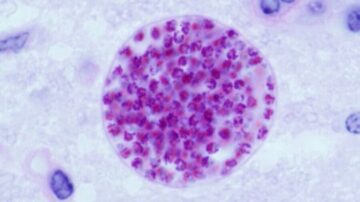Shelly Fan in Singularity Hub:
 The brain is like a medieval castle perched on a cliff, protected on all sides by high walls, making it nearly impenetrable. Its shield is the blood-brain barrier, a layer of tightly connected cells that only allows an extremely selective group of molecules to pass. The barrier keeps delicate brain cells safely away from harmful substances, but it also blocks therapeutic proteins—like, for example, those that grab onto and neutralize toxic clumps in Alzheimer’s disease. One way to smuggle proteins across? A cat parasite. A new study in Nature Microbiology tapped into the strange world of mind-bending parasites, specifically, Toxoplasma gondii. Perhaps best known for its ability to rid infected mice of their fear of cats, the parasite naturally travels from the gut to the brain—including ours—and releases proteins that tweak behavior.
The brain is like a medieval castle perched on a cliff, protected on all sides by high walls, making it nearly impenetrable. Its shield is the blood-brain barrier, a layer of tightly connected cells that only allows an extremely selective group of molecules to pass. The barrier keeps delicate brain cells safely away from harmful substances, but it also blocks therapeutic proteins—like, for example, those that grab onto and neutralize toxic clumps in Alzheimer’s disease. One way to smuggle proteins across? A cat parasite. A new study in Nature Microbiology tapped into the strange world of mind-bending parasites, specifically, Toxoplasma gondii. Perhaps best known for its ability to rid infected mice of their fear of cats, the parasite naturally travels from the gut to the brain—including ours—and releases proteins that tweak behavior.
The international team hijacked T. gondii’s natural, brain-targeting impulses to engineer two delivery systems, one for a single-shot therapeutic boost and another that lasts longer.
More here.
Enjoying the content on 3QD? Help keep us going by donating now.
